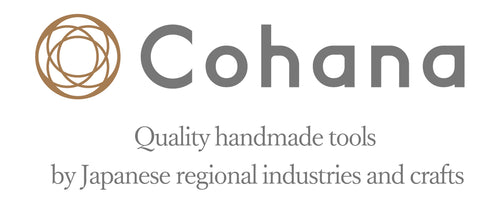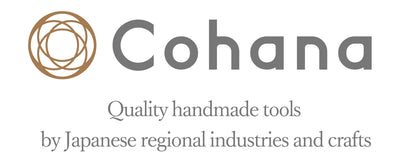Vol.5 Masahiko Morikawa in London & Belgium

Series Cohana and Ninigi
In this series, we would like to share stories and the latest information related to handicrafts, focusing on the "people" who passionately work in various fields of handicrafts.
Cohana and Ninigi Vol.5
Masahiko Morikawa in London & Belgium
In 2012, Masahiko Morikawa founded the garment manufacturing company Studio Masachuka Limited in London, UK. He has primarily worked in Europe, creating high-quality garments that blend Japanese tradition with modern design. In their garment creation, they prioritize craftsmanship grounded in solid technical skills and are dedicated to preserving and passing on Japanese traditional knowledge and techniques. He also runs an online haberdashery shop called Eight Needles, which sells Japanese-made sewing tools and materials, including Cohana products.
The article will be divided into two parts, Vol. 5 and Vol. 6. In this first part, we'll introduce Mr. Morikawa's history with handmade crafts, his global adventures, and his activities.
Can you tell us how you came to know Cohana?
During the COVID-19 pandemic, we started selling Japanese-made sewing tools online, primarily targeting the European market. That's when I discovered Cohana, and I was very intrigued by their concept and designs.
Cohana produces excellent products that blend modern design with traditional Japanese techniques, combining quality and ease of use that have global appeal. We sell Cohana products on our site, and they consistently rank among our top-selling items.
Why did you choose Europe as your your base?
Since I was a student, I always wanted to start a business overseas, regardless of the industry. During my student days, I traveled the world as a backpacker to learn about different cultures and meet new people.
I wasn’t particularly interested in Europe initially, but I moved to London with my wife, who is from Belgium, to pursue our respective goals. In 2021, we moved with our family to Belgium, where we now live, commuting weekly to London and other European countries for work.
Tell us about your handmade history.
I have been interested in making things since childhood. In high school, I developed an interest in fashion. During university, while travelling in Mexico, I was completely broke, so I made a living by working as a calligraphy artist on the streets in Mexico. I used the money to buy denim when I left Mexico and brought it back to Canada where I was studying at that time. I customized the denim with calligraphy and Japanese patterns and sold it there.
 Street calligraphy performance in Mexico
Street calligraphy performance in Mexico

Life in Mexico
After graduation, I received a job offer in Singapore but couldn’t forget my experience in Canada. I returned to my hometown of Kumamoto and decided to start a denim manufacturing and sales company with a friend. However, lacking the necessary skills and knowledge, I decided to work at a local sewing factory for three years, from morning till night.
After moving to London, I had the opportunity to work at a sewing factory where I contributed to making costumes for the 2012 London Olympics.

Sewing factory I worked in London

Costume dress making for London Olympics

The dress worn at the London Olympics opening ceremony
(girl in the foreground at left)
I met Japanese designer Kana Shirouchi at that factory, and together we founded the brand and later started Studio Masachuka based on the experience I gained while running the fashion brand.

Shooting for the brand
In London, my days were filled with pattern-making and sewing. Unlike in Japan, where there is a noticeable distance between designers and the factories or artisans, in Europe, they work closely together. This proximity allows for a more integrated approach to clothing production, which I found to be a significant advantage in Europe.
How did the pandemic affect your business?
The pandemic wiped out all our regular work. We managed to sustain our business by making and selling masks.
In 2022, we partnered with Uniqlo to support their sustainability-related projects. This includes running workshops on Sashiko, creating upcycled products, training Uniqlo staff, and making special display items for their stores throughout Europe.

RE. UNIQLO STUDIO First store Repair Studio
at UNIQLO Regent Street Store in London


2m x 8m Sashiko curtains made for UNIQLO's Swedish store

Sashiko tapestry displayed at UNIQLO Denmark store

Sashiko jacket displayed at UNIQLO Denmark store
It’s wonderful to see Japanese Sashiko thriving in Europe.
Sashiko, now popular in Europe, is Japan’s original sustainability practice. The tradition began about 500 years ago, enhancing the warmth and durability of cotton fabric when it was a precious commodity. It embodies the wisdom and craftsmanship of people who valued using every bit of fabric fully.
Your journey is inspiring, Morikawa-san.
From street calligraphy in Mexico to repairing and remaking items with Sashiko in Europe, it’s fascinating how the core of “showcasing Japanese culture” remains constant despite changes in location and scope.
Morikawa’s Favorite Cohana Seki Mini Scissors |

I always carry these with me on business trips. With frequent travel, it’s crucial to have my Sashiko tools with me. The Seki mini scissors, which are allowed in carry-on luggage, are especially handy when I fly.
Thank you for your cooperation!






